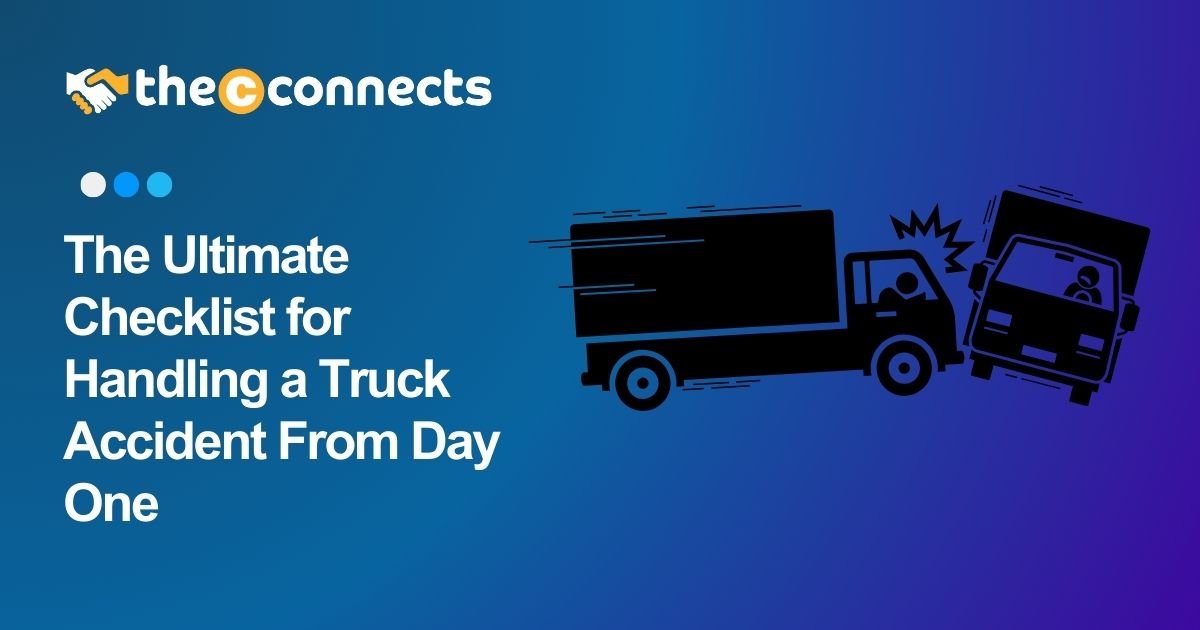Fort Worth, TX, stands at a crossroads of commerce and constant movement, with major trucking routes like U.S. Route 287 seeing heavy traffic daily. As a vital hub for freight and logistics, the city’s roads bear the weight of thousands of commercial vehicles, an unfortunate setup for potential disaster. Tarrant County saw over 1,000 large truck accidents in 2023, reflecting a significant increase from the previous year, with dozens resulting in serious injuries or fatalities. This isn’t just a statistic for Fort Worth residents; it’s a growing public safety concern.
In the aftermath of a truck accident, the steps you take or fail to take can have long-term legal and financial consequences. Unlike standard car crashes, truck accidents involve multiple layers of liability, from driver negligence to corporate responsibility and federal regulations. That’s why having a clear, actionable plan from day one isn’t just helpful; it’s essential. This checklist will walk you through what to do immediately after a crash, how to protect your rights, and when to call a Fort Worth truck accident lawyer to step in.
Ensure Safety First
Your priority after any accident should be safety. If you can, move vehicles out of traffic to prevent further impact. Activate hazard lights to warn drivers. Perform a safety check of yourself and any other parties involved for injuries. If any injuries are involved, call emergency services.
Contact Authorities
It is crucial to inform the police, no matter how severe the accident is. An official incident report, which may be required for insurance claims, will be recorded. Cooperate with the police and provide accurate incident details without admitting fault or suggesting the event’s cause.
Gather Information
One of the most important things you can do is obtain information at the scene. Swap details among everyone involved, including names, contact information, and insurance particulars. Take down the truck driver’s license plates, the name of their company, and any distinguishing number on the vehicle. Once at the accident scene, take photos of how the cars are positioned relative to each other, how the vehicles sustained damage, and pictures of any skid marks visible on the road. These photos can help you build your case later on.
Identify Witnesses
Witnesses may be able to provide objective observations of what occurred. If there are witnesses, get their contact information. It might be invaluable to your situation, helping clarify events with testimony supporting your account of what happened.
Seek Medical Attention
It is best to see a doctor for an evaluation, even if the injuries seem minor. Some injuries may not be visible or apparent. A medical expert will help detect underlying problems and provide documentation for your accident claims.
Notify Your Insurance Company
Contact your insurance provider promptly. Provide a detailed report about the accident, mention the date and location (city, state, and address), and the parties involved. You need to determine the extent of your repairs or medical expenses coverage.
Keep Detailed Records
Documentation is key. Keep documentation of all related issues, including police reports, medical records, correspondence between insurance companies, etc. This creates an organized history of events that assists with any legal or insurance processes to ensure nothing gets missed.
Understand Your Rights
Being aware of all your rights will help you make better decisions. It may be worth speaking with a lawyer if you’re facing disputes or damage, particularly if there are disagreements or thousands of dollars of damage to sort through. They can help you with specifics to your situation and guarantee you are treated fairly.
Consider Legal Assistance
In the case of truck accidents, there will be complicated legal and insurance issues involved. To overcome such challenges, you will need a lawyer to advise you on possible compensation for damages or injuries. They can be beneficial during negotiations or in court.
Assess Vehicle Damage
After tending to safety and the immediate aftermath, examine the damage to your car. Get repair quotes from reliable mechanics. Your insurer might need to see several estimates before repairing the car. Keep a record of all repairs performed.
Plan for Future Prevention
Reflecting on the accident will result in better driving habits. Knowing how to prioritize safety becomes vital to prevent future incidents. Focus on what steps could be taken to avoid similar incidents from happening in the future. Defensive driving classes or refresher courses can help develop awareness and improve skills.
Stay Informed
Staying updated on traffic laws and regulations can also be beneficial in preventing future accidents. Knowing your legal rights and responsibilities can ensure you are ready if it does happen again. Keeping your skills sharp by brushing up on driving practices and safety steps is a great way to play defense.
Wrapping Up
To handle a truck collision, you should think quickly and clearly. This checklist can help a person better deal with the aftermath. Safety first, collecting key information, and asking for professional help are the first steps in this process. When addressed properly, one can overcome the struggles of a truck accident and find relief knowing everything is being handled while they get back on their feet.



